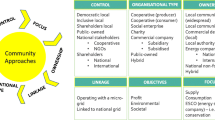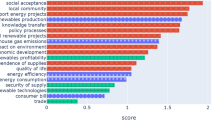Pilot Society and the Energy Transition
Overview
- Authors:
-
-
Marianne Ryghaug
-
Department of Interdisciplinary Studies of Culture, Norwegian University of Science and Technology (NTNU), Trondheim, Norway
-
Tomas Moe Skjølsvold
-
Department of Interdisciplinary Studies of Culture, Norwegian University of Science and Technology (NTNU), Trondheim, Norway
- Explores key theoretical debates within social scientific studies of energy transitions
- Links innovation, participation and citizenship in a novel way
- Examines the role of pilot and demonstration projects in innovative energy transitions
- This is an Open Access Book
About this book
This open access book examines the role of pilot and demonstration projects as crucial devices for conducting innovation in the context of the energy transition. Bridging literature from sustainability transitions and Science and Technology Studies (STS), it argues that such projects play a crucial role, not only in shaping future energy and mobility systems, but in transforming societies more broadly. Pilot projects constitute socio-technical configurations where imagined future realities are materialized. With this as a backdrop, the book explores pilot projects as political entities, focusing on questions of how they gain their legitimacy, which resources are mobilized in their production, and how they can serve as sites of public participation and the production of energy citizenship. The book argues that such projects too often have a narrow technology focus, and that this is a missed opportunity. The book concludes by critically discussing the potential roles of research and innovation policy in transforming how such projects are configured and conducted.
Similar content being viewed by others
Article
Open access
09 September 2019
Article
Open access
17 May 2017
Article
Open access
15 August 2023
Table of contents (5 chapters)
-
-
- Marianne Ryghaug, Tomas Moe Skjølsvold
Pages 1-22Open Access
-
- Marianne Ryghaug, Tomas Moe Skjølsvold
Pages 23-62Open Access
-
- Marianne Ryghaug, Tomas Moe Skjølsvold
Pages 63-92Open Access
-
- Marianne Ryghaug, Tomas Moe Skjølsvold
Pages 93-112Open Access
-
- Marianne Ryghaug, Tomas Moe Skjølsvold
Pages C1-C1Open Access
-
Back Matter
Pages 113-130
Reviews
This important book interrogates scholarship on sustainability transitions with insights from Science and Technology studies (STS) by focusing on pilot projects. The analysis is both critical towards dominant paradigms, and refreshingly constructive in the sense that it describes new ways of thinking about innovation practice and technology policy. The book urges us to look beyond technological solutionism, to examine how the energy transition also requires experimentation and even transformation in social domains. Pilot Society is a valuable contribution to discussions about how to make energy transitions just, fair and more humane, and it will be an important resource for students and scholars alike. Highly recommended!
(Benjamin K. Sovacool, University of Sussex, UK and Aarhus University Denmark)
About the authors
Marianne Ryghaug is a professor of Science and Technology Studies at the Norwegian University of Science and Technology where she leads the research group on Energy, Climate and Environment. Over the last twenty years, her work has focused on the linkages between energy and climate policy, technological development and innovation, and public participation.
Tomas Moe Skjølsvold is a professor of Science and Technology Studies at the Norwegian University of Science and Technology. He is the deputy director of the Norwegian Centre for Energy Transition Strategies (NTRANS) and has published extensively on socio-technical aspects of energy transitions, as well as scientific processes within climate and sustainability science over the last years.




